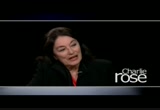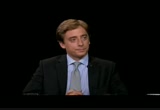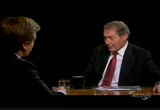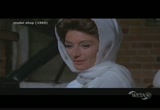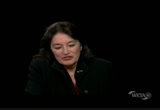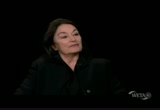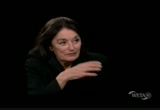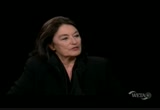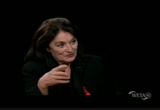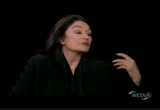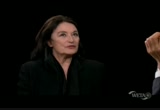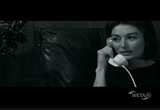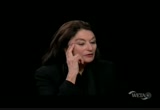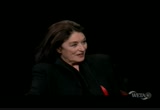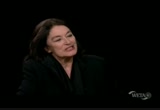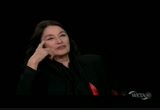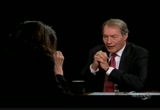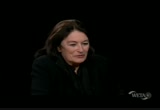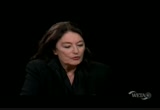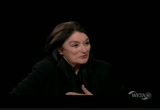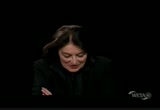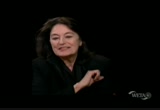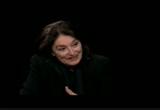tv Charlie Rose PBS October 16, 2012 12:00pm-1:00pm EDT
12:00 pm
with evan as knows, the beijing bureau chief for the "new yorker" magazine. that accident last summer became really china's hurricane katrina in many ways, it became the iconic failure of government performance and for years the modern chinese state has been founded on an idea which is let the communist party rule without challengers as long as they are competent and they continue improving your lives. after that crash last summer, the thing that surprised all of us who live there and follow the country closely, the crash didn't just fade off the newspapers the way these things often would. it became a rallying cry. it became -- the question for everybody was why did these trains collide? and so it became a question
12:01 pm
about government performance. >> rose: we conclude with this eving with the captivating anouk aimee, who can ever forget "a man and a woman" directed by by claude lalouche. >> i've been very lucky, really. and marco bellocio who i like very much, too, i've been very lucky, really. it's incredible to work with people like this. >> rose: evan osnos and anouk aimee when we continue.
12:03 pm
from our studios in new york city, this is charlie rose. >> rose: next month, the chinese government will undergo its most important leadership transition in recent history. the event has raised questions about the country's political future. even osnos is a long time observer of china. in this week's new yorker magazine he writes about how the pail your of the country's railway industry reveals a dark side of chinese growth. it's called "boss rail: the disaster exposed the underside of the boom." i'm pleased to have evan osnos back at this table. welcome. >> thanks, charlie. >> rose: tell us about this railway disaster and what it says. >> this was a train crash last summer that turned out to be more than trains. what happened was quite simple on its face. there were two trains going down a track on the southeastern city of when jo and they collided with each other. and we found out it was because there was a broken signal that failed in the thunderstorm and one train didn't know where the
12:04 pm
other train was. we've learned that in fact it was something much broader which was that this was ultimately a failure of a system. this was a failure to be careful about safety. it was a failure to make sure money was going to where it was supposed to go in engineering and ultimately it was a failure of political design because this thing was designed to be a political symbol, they moved too fast, they went too far and as a result there was a tragedy. >> rose: there was a rush program to get all this high speed rail completed before the congress meets. >> that's right. this was really the greatest symbol of the new china. china was building more railways more high speed railways. >> rose: than anywhere else in the world? >> than anywhere else in the world. they did it in less than ten years. more than europe, japan, everywhere combined. and they wanted this to be their calling card to show their new technological capabilities and as a result they had to meet all of their targets on time and particularly the 90th birthday of the communist party and as a
12:05 pm
result they cut cornerss. >> rose: even the japanese who built some of the elements said this is 25% faster. >> they said you're running these trains-- which we know very well-- 25% faster than we would ever run them. that's not safe. that warning was issued to the chinese before the crash. you have to understand hit in the context of why this happened. i mean, the people who were running the train system were not necessarily determined to try to build a system that wasn't going to be up to the standards of what they needed to be but what they needed to do was to satisfy the political objectives which was to have these trains running on these days that would fortify the image of the communist party. the truth was, it was ultimately impossible to do it and that was the result. >> rose: what are the implications of this? >> that accident last summer became china's hurricane katrina in many ways. it became the iconic failure of government performance.
12:06 pm
for years the modern chinese state has founded on an idea which is let the communist party rule without challengers as long as they are competent and continue improving your lives. and the thing that surprised all of us that lived there, after the crash, it didn't just fade off the newspaper it is way these things would. it became a rallying cry. it became -- the question for everybody was why did these trains collide? so it became a question about government performance. people said where has our money gone? has it gone into people's pockets? why were these engineering standards ignored? why was testing rushed? the statistic people point to in china is that in japan they've run a high-speed train network for 47 years with one fatality, somebody caught in a closing door. in china they ran these trains for three years and they had an enormous accident so this became the defining motion -- >> rose: we also have the bo
12:07 pm
shill lie case that's taking place there. xilai. the wife has been convicted and sentenced. >> that's right. >> rose: and he's been dismissed from all political responsibilities? >> that's right, and he'll go on trial eventually. >> rose: that's about corruption? >> that's about corruption and political factions but fundamentally it's about corruption. >> rose: so has china been shaken to its core? what's the question being raised by all this? >> the question being raised right now whether the chinese government at its highest levels has lost its way. fundamentally what we've all believed over the last 30 years is that while there may be corruption at the low levels, when you've got that much money floating around with a one-party state you're going to have corruption. but for a long time the chinese people and those of us who observed the place believed basically the highest levels of the party, they couldn't afford to be that corrupt. they had to be disciplined. they had to be thinking about ultimately the people's interest first. what we've learned from the bo xilai case and the minister of
12:08 pm
railways who's turned out to be spectacularly corrupt, he had $150 million he took out of the system, he was taken $60 million in order to buy his way on to the politburo. what this has done is is it has reframed the debate and forced people to ask whether the people at the very top of the communist party are still operating with the state's best interest, with the people's best interest or whether it's being something closer to a kleptocracy. this is a problem because the chinese state does not rule on the basis of ideology, it doesn't rule on a mandate from the public, it rules on the basis of competence. and if it loses that it loses everything. >> rose: it rules also on the basis of fear that somehow the system will collapse that gives the party all the power. >> people know that the absence of the communist party right now would be a frightening phenomenon. look there is no other party capable of stepping in right away. there's no church. there's not an alternative power
12:09 pm
structure. so people are left in the position of putting their faith in leadership. but i'll give you an example. bloomberg news did a calculation. bloomberg figured out that the family of the incoming president of china had accumulated assets of over $100 million. he's a government public servant he has never been in business and this fact was so inflammatory to the chinese government that they blocked bloomberg in china and it's been blocked ever since. the web site is unreachable. so the idea that the individual members of the top of the chinese government are now profiting from that experience is for the chinese government they know their greatest vulnerability. >> rose: and he'll certainly move up to the presidency. >> he will. that's one of the things we know. over the course of the next couple months we'll get a new committee of seven members who will run the country for the next ten years. >> rose: who will they be? >> well, one is jinping, he's
12:10 pm
the son of a former party leader he was sent out to suffer in the country side along with other intellectuals from the city. >> rose: he was himself? >> he was hi thrived and ended up as party secretary of a village. he thrived within the system and he's a product of that system. he got a ph.d. in sociology. so he -- some of the other names arely kuchong likely to be the prim mere. he ran an enormous province and he has distinguished himself within the system. and i think the key fact about these guys is they're very similar to each other. these are all basically men in their late 50s and early 60s raised within china, educated in china and all of them have thrived by notff oending people along the way. >> they've had a different kind of exposure than the generation before them. >> that's key. the key thing is they realize china isn't the country it was 30 years ago when deng xiaoping
12:11 pm
launched them on these reforms. it has to be responseive to international pressure and participate in the international system. china used to be a poor country and they could get away with a lot. people would forgive it of a lot. today it's the world's second-largest economy. it's expected to play an active role in issues like iran and north korea xi jinping is a much more sensitive politician than his predecessors were. he gets that. if you see him in the crowd in los angeles watching a baseball game he almost looks like a plausible participant in the politics we know. >> rose: and had experience in america, too. i >> he did. he went to iowa and spent time there. >> rose: so only seven members that rule the committee. nine >> there's nine now. >> rose: nine and they're reducing it to seven. why? >> part of the idea is the leadership has gotten diffused across so many people. there's so many different voices in the room running the country it's almost impossible to get anything done. which sounds funny to us because
12:12 pm
we think of china as getting things don't efficiently but they have not taken the steps of economic reform people want them to take, reduced the role of the state-owned enterprises and boost consumption, get away from the old model. >> rose: and state owned enterprise versus private owned enterprise according people from china who come here who own chinese private companies. >> that's right. it's a hard place to be a private entrepreneur. 50% of the economy is dominated by the state-owned enterprises. if you look at the "fortune" 500 list, the chinese companies that are on there, at least 30 out of the 50 on there are state-owned enterprises. >> rose: two of the chinese banks are two of the largest banks in the world? >> exactly. and they want to go from the old state capitalism model to a model that promotes entrepreneurship, promotes innovation and can get them out of this middle income trap. that's the challenge. >> rose: and serve domestic demand rather than export. >> they've got an enormous market they have to unleash. that doesn't just mean telling people to buy, it means you have
12:13 pm
to figure out a way to move money from these very, very rape state-owned enterprises into the pockets of ordinary consumers. that means liberalizing the banking system. it means taking very hard choices. >> rose: what role will hu jintao have after the transition takes place and zhang tse minute? >> and that's central to whether or not xi jinping will take these steps. jiang zemin, the former president, has maintained a role -- not a formal role but he's maintained influence in government since leaving office ten years ago. and the fear is if hu jintao also maintains that much power then you're going to have three competing power bases: the new president, the old president and his predecessor. that's a recipe for gridlock. the hope is that as these generations get further awrite a if the old dictatorial system they will be able to gently move off stage. >> rose: what's the difference in the juice between jiang zemin and hu jintao.
12:14 pm
>> they don't have an ideological difference but they come out of different schools. hu jintao in his own way is a very, very cautious man it sounds funny that-to-say that jiang zemin gave an interview in english on american television. in this case he spoke to leslie stahl, he talked about -- he talked about tiananmen square. hu jintao in the ten years he's been in office has never given an interview to a foreign journalist except for a polish publication years ago. he has secluded himself within the government and that is representative of a mind-set and it's a conservatism that has really turned out to be paralyzing. in china today people are talking about what they call a lost decade. i think that's too strong. over the last decade even as china has been doing all of these extraordinary things, building roads and bridges, railway plans they have also not taken hard choices on political reform. they have still not opened up, for instance, even culture.
12:15 pm
you can't put a movie into chinese theaters without going go into into censorship authorities. those are the choices they have delayed. >> rose: and that's because of fear. they think if they do that it will create certain kinds of erosion of their power? >> that's right. they believe if they lose the monopoly on authority and the monopoly on information, what's next? >> rose: what happens to bo xilai? >> he goes on trial and they will deal with him. i think he won't get a death sentence but he may get a suspended death sentence which is a life sentence that gets reduced. >> rose: what's the charge? >> taking huge bribes, that's the language they used with oops with participating in the coverup of a murder of an english businessman. >> rose: by his wife. >> by his wife and what they call other crimes. >> rose: and what about the man who was head of security? he's been arrested? >> he's gone to jail because he
12:16 pm
defected to the u.s. consulate. he tried to defect and they sent a very clear message "you will not do this. nobody will do this." that's the last thing they want to do. >> rose: there there's also this. wasn't there someone who was in jeopardy because they thought he might be protecting -- >> yes, that was the head of security for the state. in the end he was not damaged by this as far as we know, but one thing that's significant is he's been the father of the security apparatus, the stability maintenance program which has become enormous over the last ten years. he may be -- his portfolio may be diminished under the new government, which means that that may be a signal that they want to try to give people a little bit more space in their lives, move away from this obsession with security and maintaining absolute tight control over people's lives. >> rose: can you imagine allowing complete access to the internet? >> rose: no, i think that's probably going to be a slow one to take hold. the reason is for them information is power and they
12:17 pm
fundamentally believe that if they lose control over information then they lose control over the country. and i think that for them is the red line. weed that nobel prize last week awarded to a chinese author named mo yen. some of his books have been banned in china. but the thing that was extraordinary about it is they had railed against the last nobel prize that went to a chinese person, a man in prison for 11 years for subverting state power. but when mo yen got the nobel prize there was a collective decision to celebrate it. and it's been a festival. but the thing that's so extraordinary is if you look at their work, there are many things they have in common. there was a decision made that liu jiabao, his information was too dangerous. and mo yen they've decided to endorse it. >> rose: what's happening to the chinese economy? >> it's slowing down. it's at 7.5% growth. they had 10% growth for 30 years but i think understoodmently
12:18 pm
this is a rationalizing process, this is the process of them moving towards a more sustainable rate of growth. it's happened in other countries -- >> rose: which is around 7% or%? >> it may go down to 6%, 6.5% -- >> rose: and that's sustainable? >> they had it far while. japan had it, korea had it, taiwan had it. all of these countries hat a certain point have to go into --. >> rose: so are there bubbles in the economy? >> there are still. infrastructure and real estate development maintains a huge bubble. >> rose: did they do their stimulus right? >> it was too big. >> rose: too big? >> i think the recognition was too big. >> rose: theirs was too big and ours was too little according to some economists. >> they there's a feeling it was too large and too fast and given to the wrong people. one of the big recipients was the railway system. >> rose: yes. (laughs) >> and they said throw money at this thing. that is great opportunity for us to build -- >> rose: and was it to create jobs? >> it creates jobs. it's useful.
12:19 pm
look, they need the railway. and if they can work out the engineering problems and corruption problems it will be a great benefit to the country. in the 19th century, the united states built a railroad and it was incredibly corrupt, too. >> rose: then in the '50s eisenhower built the interstate highway system which was a huge success. >> it was a huge success. one of the reasons why our programs in the end can be cleaned up is because we have institutions that help do that. we have a free press, we have courts, we have voters who can make choices about how they want their money to be spent other countries have faced the same thing. japan, korea, they've all faced it. >> rose: i'm told the chinese military says the u.s. wants to contain us so we have to develop a carrier fleet and we have to build up our own resources even though they want to contain us. on the other hand, united states says no, that's not what we want to do. we want to be a power in the pacific but we don't want to contain you. but if they operated with certain misconceptions, that could lead to danger or something like a conflict with japan could explode.
12:20 pm
>> rose: that's the real danger is that there is a sense, and it's percolating from the military and the party leader that the united states is determined ultimately to prevent china from becoming a rival, becoming another superpower. >> rose: is there any evidence of that? >> well, i think if you asked cue sid dees -- if you went back through history -- >> rose: (laughs) it's human nature in politics? >> absolutely. he would say great powers never naturally and comfortably make room for other powers. >> rose: what do we would do that would reflect that maxim? >> well, in the middle of -- >> rose: near rom of politics. >> during the last term of obama's stras we saw a pivot towards asia. it was a decision to reembrace asia as a sphere of our influence. we're opening a base in australia. some of it is symbolic. we're taking a more active role in the territorial disputes around the region. fundamentally we're reminding our friends like japan and korea and india that we are there and we are pacific power, as the
12:21 pm
president reminds people. and we're not going anywhere. in a sense this is a little bit like the monroe doctrine, this is like china is a certain point -- deciding in a certain point in its development it wants to have dominance over its neighborhood but we're not ready to go. president obama has said we will remain a pacific power. >> so the next thing we should watch for in china is, what? >> rose: the national people's -- the next thing to watch out for is the 18th party congress in november. you'll see a new generation of leadership come in and keep abeye out for them to make symbolic moves in the first couple years that indicate that they want to give people more room in their lives. maybe easing off the internet a little bit. >> rose: and with the level of social media they do have, is there increasing demand for that at every level of society? >> there is, the internet has turned out to be more disruptive to the chinese status quo than the chinese thought it was. they were scared of it.
12:22 pm
it has turned out to be extraordinary. and there are ideas -- there's this sort of -- it's easy to get a utopian view of the internet and china but it's been enormously important. >> rose: then there's the fear about hacking and chinese companies who want to do business here and whether they are somehow an agent for them to acquire certain kinds of high tech companies that would give them an insight into our own national defense, national security. >> yeah, the latest case is a chinese company that was recently -- the federal government government has said they are not a company to be trusted and hua wei has fought back bitterly. but what's interesting about this is this shows the failure of the chinese government to build credibility abroad. this is a company that has distinguished itself as a telecommunications firm. it's a rival to companies like i.b.m. and other major players
12:23 pm
in this space. but actually they're being damaged by the fact that the chinese government is not trusted and so it's a really awkward problem because they want to promote their businesses overseas but ultimately it's the government that is holding them back. if china wants to become the next great power, it has to be able to create the kinds of brands that will project its power abroad and right now what people say is "i wouldn't put my data in a chinese cloud." >> rose: we've heard people here publicly and privately, people from the national security apparatus, especially former c.i.a. directors, that the chinese do more spying on us than any other nation. >> that's true. >> rose: that may because they have the capability, but they do more than any other nation. in the private and public sector. >> and there is a merging, in a sense. those two worlds merge in china in ways they don't in the united states. if you're somebody who goes abroad for china, whether it's as an engineer or academic and you come home, you may get a phone call asking you to come
12:24 pm
back and talk about what you've seen and done and you can't say no. and that's a different kind of environment than what we're accustomed to. and i think chinese government has a trust deficit to make up with not only its own people but the rest of the world in showing they want to play by the same rules. >> rose: when you look at their relationship with the united states, do they think the obama administration has been a positive -- has advanced the bilateral relationship? >> they've been surprised at how tough the obama administration has gotten on them. in the beginning they thought that they had a pretty good deal. you know, the obama administration came in with a handout stretched and they said we are willing to make a deal with you on important issues like climate change, things where we have obviously shared interests. let's get something done. and frankly the obama administration felt like they got rejected and they suffered for it politically at home. they were being beaten up for having offered too much to the
12:25 pm
chinese. over time what you saw was a real evolution in the obama administration's popsy towards china becoming much tougher. >> rose: and as the political season approached. >> rose: and as the political season approached it got easier for them to do it. more important for them to do it. right now -- you know, mitt romney was originally very popular in china four years ago. harvard educated guy, he organized an olympics. these are the things the chinese understand. >> rose: right. >> it's turned out he's been the most stridently anti-china -- >> rose: and the first thing he says he deal -- >> exactly. so the chinese have had this unpleasant wakeup call with mitt romney. >> rose: good to see you. >> my pleasure, thanks. >> rose: even osnos, we'll be back. stay with us. >> rose: anouk aimee is here;. she has been an icon of french and international cinema. she's acted in over 80 movies. in 1960 live magazine called her "the left bank's most beautiful resident."
12:27 pm
>> you don't know me at all. you followed me in the streets,, now you love me. it can't be very serious, can it? >> believe me, you'll get over him. you're a strong woman. right? >> yi, i'm a strong woman. >> in love you can forgive to be betrayed but i don't think you can be betrayed in friendship. you know, in love you can because passion and all that. if you love men, you have to admit it that they're cowards.
12:28 pm
but you have to love them as they are. >> rose: we are cowards? >> we begin like this? >> rose: (laughs) >> a little bit. that's part of your charm. >> rose: (laughs) we'll congress be to that. you're in new york for the necessary value of film preservation at the museum of modern art. you're presenting new digital restorations of three of the movies "lola" "justine" and "a man and a woman." great to have you here. >> thank you, thank you very much. >> rose: when you think about those films, do you think about how lucky you've been? >> how lucky, yes. how lucky i've been to work twice with fellini, with marcello several times. claude lelouch, i've been very lucky, really.
12:29 pm
and bert lucci and i've been very lucky, really. >> rose: and you work with them and they inspire you? >> well, i learned when i was 14 years old, you know? and i'm -- during my studying you know i was going to school and all that but it was very serious in france. the director was very serious. so i began to be an actress but i don't want to be an actress, i wanted to be a dancer. i don't know if you want to know that. >> rose: yes, i do very much. i want to know. >> so i was an actress and i was lucky and i worked with many people, you know, great actors. and i enjoyed but -- there was a
12:30 pm
"but." because some time in france we take ourself a little bit seriously, you know? you can't laugh. if it laughs it means you're not serious. then i met fellini and suddenly that was like an explosion in my life. suddenly you -- you could do your work seriously but don't take yourself seriously. >> rose: that's been my philosophy. >> and that is why i love to be an actress. i love it. don't take yourself seriously. >> rose: beyond that, what was the genius of fellini. >> he was genius. what can i say? you never saw him on the set, no? >> rose: no. he was a magician.
12:31 pm
intelligent, insupportable, everything. i mean, you can't explain why he's a genius. anyway, we don't need them so much -- >> rose: you don't need them? >> we don't meet them. >> rose: claude lelouch? >> claude is different. claude was a very young director. he was 28, 27 when he made a man and a woman and we didn't have -- it was a small production, i did the make up. >> rose: you did your own makeup? >> yes, and in "lola," too. i made small films, yes. >> rose: pauline kale who's one of our best film critics, best, called "man and a woman" the most efficacious makeout movie of the 1960s. >> well, that film had been made at the right moment. you know then claude was being
12:32 pm
at the camera, you know that. >> rose: yes, i do. >> but that film because it was sex schism and it was unbelievable, i touch people. but it's like a love story sometimes you meet a man or -- too early or too late. the right thing is you meet on the right time. and "a man and a woman" was on the right time with the audience. it was the film, you know? it was a love story. >> rose: it was the right time? >> the right time! way claude directed. the way he photographed. the way we acted. it was the right moment. >> rose: but you can't explain it. it just is. you don't say how do you create the right moment, it just is. >> the way he carried the camera the way we shoot. we were a small film, about 13 all together, you know. >> rose: this is the time of the
12:33 pm
french wave? >> no, this was the new way. >> rose: the new one? >> the way claude did that, there was no director that did that before him. >> rose: but those films were part of the french new wave that took place? >> not really the new wave claude lelouch was, not really. but the director carried the camera is the first one. then the cameraman did like -- but the director, no, that was the first. >> rose: do you see films like "a man and a woman" today? are there films that have that kind of intimacy? >> well, there is a film which i think has something wonderful "separation." >> rose: yes, "separation." >> it's different. we can't do the same, of course, but it has a kind of magic you know? don't you think so? >> yes. >> rose: it's different now. there's other things. >> rose: what are they doing at
12:34 pm
the museum of modern art? what are they doing over there to restore the film and bring it -- >> they restore in the france. they've done it. and as i say they restored the film but they didn't restore me. it's an old joke. >> rose: (laughs) >> but you should ask them, they're doing it. and they brought it. i don't know. i've been invited because of the film, that's why. >> rose: how were you cast? >> what do you mean? >> rose: what led -- claude lelouch to cast you? >> what led them to cast me? >> rose: yes. >> how should i take that? >> rose: why did he choose you? >> oh, yes, i got the message. but i don't know. >> rose: you don't snow >> no, i know. actually, i was in italy, i lived in italy and jean luis and
12:35 pm
his wife is my older friend and so -- >> rose: she thought you would be right -- >> no, no, they called me. they said look, there's a young director who would like to do with both of us so can you come? we went to a meeting together. so i came from italy and we saw claude and claude told this story but knowing claude i know now that he didn't have the whole story but by looking at us and our reaction you -- he went on writing his script in his head. i know that. and he said "you want to do the film?" and we both look at each other and then the beginning of things -- you know we didn't have it in the morning, sometimes. we didn't have a script. >> rose: he made it up -- >> he saw what was right for jean-luis and right for me. >> rose: and racing cars was the right motif.
12:36 pm
>> yes, because uz jean-luis has been doing that and he loved cars -- actually, we quarrel. can i say something? >> rose: yes. >> we went from paris, all three and claude was going very fast and i began to say "you. you're going too fast, i'm afraid." "oh, no, i don't go too fast." you know, when you're 27, you -- "i'm sorry, you're going too fast." and jean-luis loves racing cars. okay, never mind. i said account request k you go slower?" we arrived, we have lunch with people then the sea is very bad. the sea is terrible as it can be over there and i said, oh, the day we deal the scene in the boat it won't be like this. he said "yes, i need that sea." "but we won't be far from the land?" "yes, because my camera turns
12:37 pm
and i don't want to see the earth." i said "because i'm very sick on the boat." "so we'll have a little boat." "no, it's not my kind of cinema." i said "okay, you do it yourself without me because me, i don't want to be on that boat." i said that because claude -- we laugh about it. we go into the hotel and you can choose another actress, i don't know if he tried to get another actress. next morning "did you find anybody? ""no." "okay, i'm here if you want." and we begin the first shot and after -- it's been a long story for all the films. >> rose: but that moment probably describes you, too. you always had a certain independence of mind, yes? >> yes. >> rose: i thought so. you've also -- what's interesting is that you have turned down roles that you might regret later, >>. >> you know my life! >> rose: i do. >> well, yes and no. for example, after "a man and a
12:38 pm
woman" which was a huge success here. >> rose: nominated for best actor, best foreign film. >> so i had proposition. there was a little man in belgium called andre dellvo and he called me and said "can i meet you? and he was a director who had just one film, belgium, i repeat and he proposed me a film and i did another one with yves and then i called my director, gerard. i said gerard, i met this person there's no money, what can i do to refuse this big film? and i thought, i must do that film. and i refused big thing to do that. but i'm not sorry. >> rose: at all? >> he was a great director. he's not here anymore. i would have loved the other way
12:39 pm
and that it was -- i'm very proud. >> rose: because you chose the film that you liked best. with where there other cases in which you could have -- >> well, i refused -- i refused -- yes, i refused because -- >> rose: refused what? >> "the conformist." >> rose: a wonderful film. >> i just got married and i said look, i worked all the time since i've 14 years old, i've never been away like this so i refused it for that. i refused to part of the wife for once. so i refused for that. >> rose: how did that work out, being the wife? >> it was a nice film. >> rose: (laughs) >> rose: before we go, here's a scene from "a man and a woman."
12:41 pm
>> it's nice. >> rose: it is nice. tell me about "lola." >> "lola" came again through jean-luis. he called me and said there's another young director that made a film. jacques demy, you should meet him. he wrote a beautiful script. so i met jacques. jean-luis couldn't do it and i met jacques and he explained to me what was lola and i accepted but it was very difficult because until then i always did parts very ingenue, very -- you know, they didn't want me as a kind of dancer's -- you know. and he really fought for me and
12:42 pm
he said "if we don't get anouk, i won't do it." >> rose: that was his first film? >> that was his first film. >> rose: that's what you do to men? >> you think so? >> rose: yes, i do. >> i never realized. >> rose: and justine. it was said you were a perfect justine who epitomizes the contradictorys of this literary character. >> of course, justine is a wonderful person but you know, we began the film and it was proposed to me and i was very interested and i accepted and after that i don't know what happened in the production it was a time of holiday between tunis where we'd be shooting and l.a. so between tunisia and l.a. they
12:43 pm
put -- through it away and cukor came, who i knew and was very lovely. i knew him through gregory peck and we went to -- but then he got a little tough with me because he told me that film was not his film. and he knew how to direct women but i don't think he was much in love with justine. and i'm sorry, i think we must never change a director. one director when we worked a lot. we worked for two months you know? >> rose: and you hate to be part of a film in sch the director doesn't love the book or the film or the idea or the character. >> but usually they always do. >> rose: i know, but this was -- >> and i'm sure george was -- what a professional. but i don't think it was what he
12:44 pm
wanted to do really. and, god i would have loved to work with him. we were supposed to do another film quite different with him that we didn't do. but i don't think it was his child. he came to help in a way. but i do think -- >> rose: it's work, not passion. >> it was -- the director, it was his baby. so i do think i was very impressed to work with george, with all the actresses >> but philippineny -- is it lelouch or fellini that resonates deepest inside you? >> well, in my life i say my family one side a fellini, lelouch, i mean i've got a big
12:45 pm
family, you know? no, but of course i'm there was kubrick, there was -- no? >> rose: no, it's true. >> help me >> no, i want you to say it because i haven't worked with him but you have and you understand and i'm interested in what makes them the way they are other than their passion and love of life and fellini's case loved women. >> but you know, he was frightened of women. >> rose: he was frightened of women? >> when women used to come and make charm he hated that. >> rose: oh! >> no, funny because some women said "oh, come on!" he said "yes, yes." he was shy. he was a very shy man. that's what i need. >> rose: but people loved him. >> everybody loved him.
12:46 pm
you could not love frederico. when he came in a room it was intelligence, of humor, of generosity. >> rose: of wisdom. >> of insupportable -- one day i always remember i wanted to tell him something, i don't know i was worried i came in, he was behind me on the phone and he said yes? i said yes. he said to me you know when i lie? i said yes. rand he said i never lie. >> rose: he could never lie because he thought you knew? >> because it's true when he lie we knew it. the people would know if he lies so it's true. and the other people, never mind. >> rose: and how about marcello? >> a dream. a dream.
12:47 pm
exactly what fellini -- be serious in your work but don't take yourself seriously. for me marcello is like a brother, really, because we worked often together, you know? and he was a wonderful person and frederico, marcello and i were good friends. we used to go and have dinner or lunch together and we laugh very much and it was a wonderful relationship. they said i was their cousin for from france. >> rose: (laughs) >> and we used to laugh. it was something extraordinary and my doctor was very friends -- my daughter was friends with his first daughter and we were all friends and i miss him. he was so wonderful. and exactly the same. he never took himself seriously. he was so funny.
12:49 pm
>> rose: so what's life like today for you? >> and for you? (laughs) >> rose: (laughs) well, i'm -- it's -- it's -- i get up everyday lucky to be alive and loving what i do and having more fun than ever and more challenge than ever and more friends to share it with than ever so i'm touched by some god who looks after me. >> well, it must be about the same, i suppose. you know? when i see so terrible things in the world and i see me, my god, i'm lucky very much.
12:50 pm
>> rose: to live the life and to continue to live the life. >> when we see what happened to a lot of people i say my god i'm so lucky, thank you, thank you. even if i tend to be grumpy about certain things but comparing to so many people i'm so lucky thank you very, very much. >> rose: in french cinema today we don't hear as much about it as we did. >> rose: well, i do think in the cinema i would say january i think that in french you're a much more good actor, good, good. but we don't have -- top, i don't think. there is more good actors now than we used to but there are a lot -- but we don't (gasps) this thing. and i think here too a little bit a star, we don't know, and
12:51 pm
suddenly you see the person, the actress or the actor and suddenly thely or the film or the -- the presence, the thing that -- yes, we have day par due but he doesn't work a lot. but den nero, pacino, and suddenly i remember a saw a play of broadway some years ago with di nero, he spoke outside the stage already we were like this. that things which magical. then you can do what you want. they arrive and say hello and it's finished. you know, like gena row lans. -- row lands? >> rose: streep, meryl streep.
12:52 pm
>> and it's terrible -- frances farmer. >> rose: frances farmer? i remember the movie well. >> unbelievable. you say there's something more than the other. and they can act next to a very good actor, they have something, they take everything. >> rose: married to baryshnikov and then to -- >> but, you know -- >> rose: sam shepherd. >> we need this kind of actor from these days. and i think here, too. i'm sorry. directors, too, huh? >> rose: yeah, sure. sure. but we have a lot of good directors working right now. >> oh, there is a lot? i don't know any of them. james gray. >> rose: oh, yes, yes, yes. but you know who just made a very good film here is ben affleck. a very good film in which he stars in. it's getting lots of attention and it shows a real touch as a cinematographer, as a filmmaker.
12:53 pm
>> let's hope now it's coming back. >> rose: indeed, yes. >> but you know what i mean? there a r a lot of very good -- something comes out, you know? what's the matter with this one? and ((inaudible). >> rose: it's the history of the business. are european women different, do you think? than american women in their attitudes towards living and their attitudes towards men? >> >> let me think on that question? how do i know? i don't really -- in america these days i don't know. i think women in general are different. in general.
12:54 pm
>> rose: women are different period. not a question of nationality, just a question of -- >> i can't say. i didn't study. >> rose: you don't to study, you know. there's no academic answer to this. >> i do think in general. in general. women don't choose -- the best in the world is -- the stronger one and they don't use it. >> rose: have you used it? >> you want to know my secret? >> rose: yes. >> no, i don't know. i think -- i don't know. i don't know. i suppose so. but the femininity is the best weapon we have. we're stronger than a man with femininity and they don't want to use their femininity, they want to be like men. that's what i don't understand. i don't talk of work and to be paid, a problem.
12:55 pm
of course. >> rose: you're talking about difference. >> but the femininity is a very important thing and very strong i remember we used to say in the history and things like men, very powerful men and we always discover them behind there was an incredible woman really was. that we can dream about is women don't want to be behind even if they're stronger. i find it -- well, i think that. i think they should use our weapons with them. >> rose: yes, weapons? >> much stronger than the man. >> rose: the femininity. it's a pleasure to meet you. >> thank you very much. >> rose: much success with everything. >> thank you. >> rose: thank you. >> come back? >> rose: yes, please come back. >> come to france. >> rose: i'll come to france. thank you for joining us. see you next time.
12:56 pm
82 Views
IN COLLECTIONS
WETA (PBS) Television Archive
Television Archive  Television Archive News Search Service
Television Archive News Search Service 
Uploaded by TV Archive on

 Live Music Archive
Live Music Archive Librivox Free Audio
Librivox Free Audio Metropolitan Museum
Metropolitan Museum Cleveland Museum of Art
Cleveland Museum of Art Internet Arcade
Internet Arcade Console Living Room
Console Living Room Books to Borrow
Books to Borrow Open Library
Open Library TV News
TV News Understanding 9/11
Understanding 9/11
